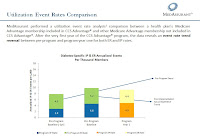 Disease Management Care Blog regulars are fully aware of the rich variety of care coordination approaches that exist outside of the patient centered medical home (PCMH).
Disease Management Care Blog regulars are fully aware of the rich variety of care coordination approaches that exist outside of the patient centered medical home (PCMH). They also know that the mainstream health policy dons have it wrong and that care coordination doesn’t come down to choosing between a Medicare PCMH and an ACO PCMH. Other options are in or outsourcing a cohort of generalist, credentialed, dedicated and fulltime nurse-coaches on a shared service basis. When done right, there is little physician disruption and a high degree of patient acceptance.
Prevailing common wisdom is wrong: primary care sites don't always need to individually hire, train and pay for a full-time nurse-coach when this human resource can be centrally managed by smart provider organizations, commercial insurers or self-insured employers using economies of scale.
In prior posts, the DMCB has repeatedly linked peer-reviewed literature describing successful "turnkey" approaches to care coordination and management. Knowing, however, that published evidence is necessary but not sufficient for changing policy, the DMCB has also been keeping its eyes peeled for real world examples of outsourced care management.
It found one during the last Care Continuum Alliance webcast.
Webcast listeners got to hear from another company that has successfully commercialized outsourced care management. MedAssurant does business with hundreds of provider organizations that ultimately touch 118 million persons. While MedAssurant is perfectly capable of providing modern remote telephonic disease management, it also offers a care management "solution" that relies on nurses who are embedded in physician offices and clinics. Their value proposition is to complement the physicians' care with additional face-to-face coaching that helps patients engage in greater levels of self-care. The nurses are backed up by predictive modeling that identifies the patients at greatest risk, a telephonic coaching program when appropriate and access to other community based services including social workers.
While MedAssurant's outcomes data haven't been formally published anywhere, it has some compelling data in the graphic above as well as information here describing increases in HEDIS and CMS Stars Ratings as well as drops in condition-related inpatient and emergency room visits. The DMCB also knows that the health insurers, employers and provider organizations that are buying or using MedAssurant's offerings are skeptical, sophisticated and demanding.
MedAssurant is doing something right.





No comments:
Post a Comment